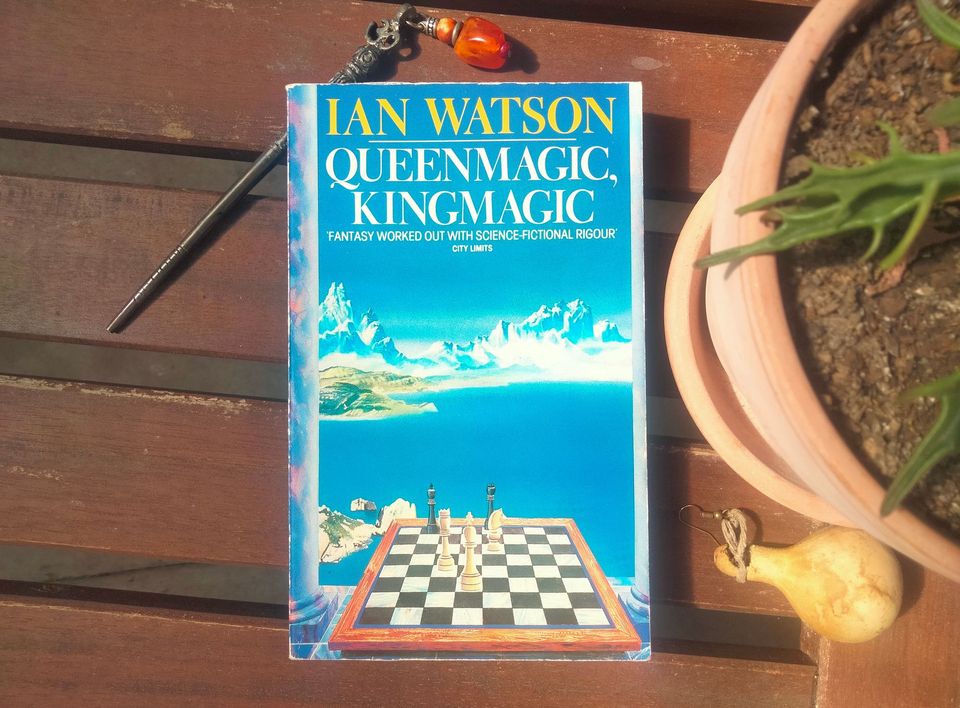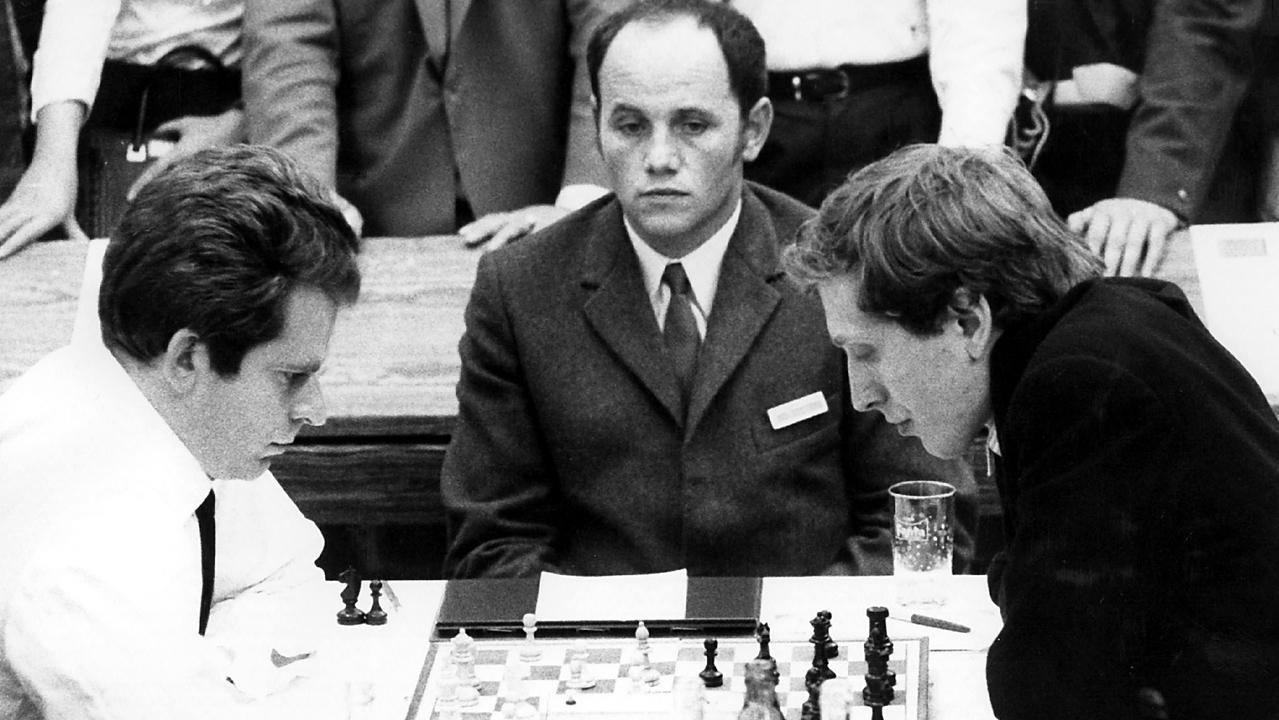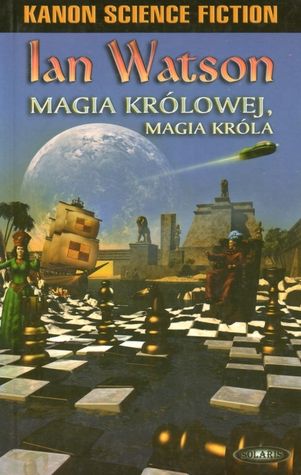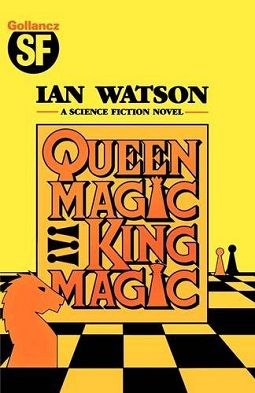Chess, Sex and Death: Ian Watson's "Queenmagic, Kingmagic"

Some books are like sleek machines, whose every part serves a delicate purpose. Others are like gardens, with various bright flowers growing from the soil of a single theme. And some books are like big sacks full of whatever the writer was thinking about at the time. Queenmagic, Kingmagic (1986), by Ian Watson, falls into this third category. It is a rambling, ramshackle sort of book, which goes nowhere in particular but at least has some fun getting there.
The novel begins by introducing us to Pedino, a pipemaker’s son. In the tradition of so many fantasy protagonists before him, Pedino discovers he has secret magical powers and a special destiny. His destiny, in this case, is to become a white pawn. For Pedino lives in a world that operates by the rules of chess. His kingdom, the shining white Bellogard, is ruled over by a king, queen, two bishops, two knights and two princes (rooks). Bellogard is locked in a simmering war with its neighbour Chorny, whose streets and buildings are midnight black.
In this world, magic corresponds to movements on the chess board. Princes and queens can teleport across great distances, and bishops can use “slantwise magic”. In one scene, Pedino stabs a black bishop to death after catching him “en passant”.
But in general, Watson plays fast and loose with the rules of the game. Pawns are repeatedly sacrificed to promote a new queen, regardless of their position on the board. And at one point a knight carries a pawn with him on piggyback—surely not a legal move in any variant of chess I am familiar with.

It is a fairly silly premise for a setting. But it works, at first, because Watson has a flair for brief, elegant description and worldbuilding. In the first chapter we find Pedino’s mother’s tobacco shop “with its heady, nostril-teasing jars of shag and rum-shag, mellowleaf and ambershred”. Next comes a fight scene where a lightning-bolt is deflected into a garden, decapitating a flock of peacocks. While the battle continues, a confused schoolmaster is seen “scurrying to pick up all the scattered heads” and “pressing his gruesome collection tidily, beak first, into the soil to hide them.”
The novel's opening chapters strike an idyllic tone, as Pedino discovers his magic and is elevated to a station within the castle. As a noble (that is, a chess piece incarnate) he is told that he is “full-souled”, while his family are commoners and thus have only “fragments of a soul”.
If this sounds unpleasantly elitist, it’s only following a long tradition in fantasy fiction. Such novels often take as given that the Divine Right of Kings is an objective fact. Aragorn really does have a special right to the throne of Gondor because of the Númenorean blood in his veins; the princes of Roger Zelazny's Amber novels really are higher beings, of whom Earth’s humans are only pale shadows.
Bellogard and Chorny at first seem to be clear-cut examples of this trend. The privilege of the “full-souled” nobility is generally left unquestioned. But as we learn more, a different perspective emerges. The kingdoms' war is conducted exclusively by magical means. The common people of both nations are happily uninvolved in the struggle; there are no armies, invasions, or even much of a border. The conflict consists of nobles sneaking, spying, teleporting, positioning, and then assassinating one another in brief bursts of one-on-one violence. The nobles, then, are privileged in their daily lives but ultimately condemned to die as scapegoats, much like the sacrificial kings of James George Frazer’s The Golden Bough.
There is one critical moment when the war does impinge on everyday life: at the end. When one king is checkmated, both kingdoms will be destroyed—“wiped off the board”—after which new pieces will come into being and the cycle will begin again.
Early in the novel, Pedino suggests it might be better to effect a stalemate so the kingdoms can continue indefinitely. But Bishop Veck rejects this notion:
“That’s how the world is powered, as a stream powers a water-wheel. Without the war there would be no energy to sustain existence. That is why there can never—must never—be stalemate; or the world would become crippled, dim, and sick, stale as a month-old muffin… We are at war so the kingdom can live.”
A grim philosophy, if one takes it as an endorsement of eternal war. But it makes sense if Pedino’s world really is just a game of chess. A game, like a life, is not a static entity but an ongoing process. Without conflict there is no game, and without the game there is no “chess”, just a pile of oddly-shaped wooden blocks.
In spite of Veck’s teaching, Pedino continues to question his role in the ongoing war. Later, he falls in love with the black pawn Sara, after first encountering her in disguise as a prostitute (or “whore”, as Watson insistently classifies her).
This brings us to sex. For a novel about chess, Queenmagic, Kingmagic is surprisingly... horny. Perhaps no-one has asked the question “What if chess pieces had sex?” but Watson sets out to answer it anyway. Several pages are spent on Pedino losing his virginity to a royal maid. She gives a confusingly Freudian explanation for why she must “draw the lava-plug from your volcano” (barf) so that Pedino does not treat the Queen as his “idealised, forbidden elder sister” and thus “resent King Karol for bedding her”.
In another scene, a white dome of the palace is described, really unnecessarily, as “not unlike an obese breast with a plump nipple”. Even more inappropriate is a non-sequitur conversation in which Sara describes how the old black King liked to get pegged by his Queen: “that’s how Mastilo got his rocks off… it amused Babula to have her monarch crying out beneath her.”
What’s the point of all this? The simple explanation is that Ian Watson was just feeling a bit, er, backed up, at the time of writing. But there is a certain thematic nexus here, if you’re willing to reach for it: Sex, death. Freud, madness. Madness: the paranoid psychosis of Bobby Fischer. Fischer, 1972 World Chess Champion, whose match against the Soviet grandmaster Boris Spassky became a proxy for the entire Cold War. And Bellogard vs. Chorny is the Cold War, of course: two empires set implacably against each other, fighting a war of espionage that does not affect ordinary lives until the moment it annihilates them utterly. So we have come round to death again.

There is one sex scene that actually does carry relevance to the plot. Sir Brant, the white knight, relates a story about his former lover Lisitsa. In the story, Brant and Lisitsa are feeling adventurous, and decide to have sex while teleporting:
‘I also had an overwhelming urge to have Lisitsa, there at the place where we pause and pivot… So, with Lisitsa aboard, I leapt to that place where I ought to make a half-hop the other way. Instead I paused. Paused, paused. I slid her around me, Lisitsa still clinging tightly to my neck. I slipped my tongue betwixt her lips and my sceptre up between those other private lips of hers.
[…] Then my feet started trying to slide sideways. It was as if I was balancing on a glassy slope which was slowly getting steeper… Way beyond her darling little head I caught a misty glimpse of... Well, it looked like a whopping big snake. Not any tiddly grass-snake or viper such as you might find in this glen here. This was something enormous, muscular and long. Rippling and strong.”
Startled, Brant loses his grip on Lisitsa and teleports away. Upon returning to the between-space, he can’t find her. She’s slipped between the cracks of the universe.

After their initial encounter, Pedino and Sara become separated for many years. When they are finally reunited, in nocturnal Chorny, the war is rapidly approaching its conclusion. Unable to save the white king from checkmate, Pedino and Sara resolve to escape their world entirely at the moment of its destruction. Following the example of Sir Brant, they make a magical jump beyond the chessboard and arrive in (can you guess?) a world of enormous squares, linked together by devouring serpents and glowing, heavenly ladders.
Yes, they really went there—“there” being Snakes and Ladders. In the second half of the book, Pedino and Sara take a voyage through three alien worlds, based on Snakes and Ladders, Monopoly and Go, respectively.
This gambit, so daring in conception, is unfortunately lacking in execution. If Watson had put as much effort into these other game-worlds as he did for chess, this might have been a book I could wholeheartedly recommend. But the settings here are paper-thin and overly literal. The Go world is crisscrossed by a grid of actual lines; the Monopoly people have to actually roll dice and risk being teleported to jail. This whole section of the book is a slog—too long for just a joke, but not long enough to give the new worlds any substance.
Perhaps surprisingly, the Monopoly world (‘Monopolis’) is the most interesting of the three. In a parallel of Bellogard-Chorny, the ordinary life of the citizens here is largely unaffected by the rules of the game. Everyone has to roll the dice daily, paying out money or receiving title deeds, according to the dictates of “legalmagic”. But both money and titles are formal only. To buy real things like food and accommodation, there is a whole different currency which must be acquired by working a real job. Trading between the two currencies is illegal. A certain class of “speculators” obsess over the game, but most people generally ignore it. One can imagine if a traveller from Monopolis arrived in our 2020s world, of crypto bubbles and meme stocks, they would feel immediately at home.
There is one point where legalmagic directly affects people, however. If you go bankrupt, you explode. This is a fairly rare occurrence, somewhere around the risk profile of a shark attack or lightning strike. But unfortunately, Pedino and Sara’s alien presence causes disruption in the game. This glitch forces them to take multiple turns per day: a distinct advantage. More or less against their will (since if they don’t participate, they blow up) Pedino and Sara begin to gather all the wealth of Monopolis to themselves. Driven to bankruptcy, the common citizens spontaneously explode until the streets run red with gore. The all-powerful Bank sends in troops to protect our heroes from vengeful mobs. In the end, everyone dies. Pedino and Sara walk through an empty city to claim their joint title as the one true Monopolist.

After some more adventures, Pedino and Sara make it back to their own world. They become reincarnated in a new version of Bellogard. This final section has a strong “eh, fuck it” vibe. Pedino is King now for some reason! Sara dumps him and shacks up with the Queen! In the last few pages, Pedino opens a portal to the upper world—our world—and addresses the reader directly: “In any event, prepare to meet Pedino! Pedino wishes to play. With you.” It’s cute, but it lacks the existential punch of other metafictional encounters like, say, Grant Morrison’s Animal Man, or Charlie Kaufman’s Synecdoche, New York.
In the end, Queenmagic, Kingmagic carries all the hallmarks of a good writer doing hack-work. There are half a dozen ideas here that could have been developed into something with real depth. Instead, Watson smushed them all together and called it a day. The result could be called a missed opportunity—but on the other hand, there’s a certain pleasure in seeing a writer treat his own ideas so roughly: like watching a rock star smash their guitar at the end of a show.





Member discussion